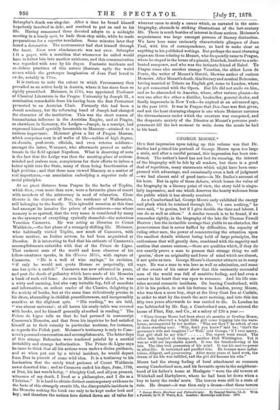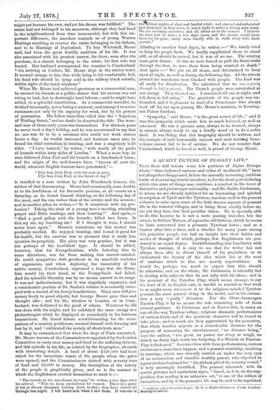GEORGE MOORE.* Oun first impression upon taking up this volume
was that Dr..
Smiles had painted his portrait of George Moore upon too large a scale, and after a careful perusal, this impression has been con-
firmed. The author's hand has not lost its cunning, the interest of the biography will be felt by all readers, but there is a good deal of repetition, many statements which might have been com- pressed with advantage, and occasionally even a lack of judgment —we lad almost said of good-taste—in Mr. Smiles's account of his hero. But in spite of these defects, which lessen the value of the biography in a literary point of view, the story told is singu- larly impressive, and one which deserves the hearty welcome from the public which it has already received.
As a Cumberland lad, George Moore early exhibited the energy and pluck which he retained through life. "I owe nothing," he once said, "to genius, but if I give double the time and labour, I
can do as well as others." A similar remark is to be found, if we remember rightly, in the biography of the late Sir Thomas Fowelk Buxton ; but the invincible courage that yields to no obstacles, the- perseverance that is never baffled by difficulties, the capacity of
ruling other men, the power of concentrating the attention upon the smallest details without losing hold of large principles, the
enthusiasm that will greatly dare, combined with the sagacity and caution that ensure success,—these are qualities which, if they do- not exactly prove a man to possess that strange thing we call genius,' show an originality and force of mind which are almost, if not quite as rare. George Moore's character attracts us in many ways. He was a man to win love as well as admiration, and some- of the events of his career show that this eminently successful man of the world was full of sensitive feeling, and had even a corner in his heart that was open to romance. And his life con- tains several romantic incidents. On leaving Cumberland, with £30 in his pocket, to seek his fortune in London, young Moore,. who was then a mere boy, slept at the Grey Goat Inn at Carlisle, in order to start by the coach the next morning, and into this inn fifty-two years afterwards he was carried to die. In London he was befriended by Mr. Ray, a Cumberland man, and entered the house of Flint, Ray, and Co., at a salary of £30 a year :—
" When George Moore bad been about six months at Grafton House,. he one day observed a bright little girl come tripping into the ware- house, accompanied by her mother. Who are they P he asked, of one- of those standing near. Why, don't you know P said he; that's the
governor's wife and daughter Well,' said George, if I ever marry,
that girl shall be my wife!' The report went round. The other lads laughed at George, as another Dick Whittington. Yet it was no wild nor improbable speech. It was the foreshadowing of his fate. The idea took possession of his mind. It was his motive-power in after-life. It restrained and purified him. He became more indus- trious, diligent, and persevering. After many years of hard work, the dream of his life was fulfilled, and the girl did become his wife."
Moore had the strong feeling of local attachment so common among Cumberland men, and his favourite spots in the neighbour- hood of his father's home at Mealsgate "were the old towers at Whitehall and Harbybrow, where he had been let down when a boy to harry the rooks' nests. The towers were still in a state of ruin. He dreamt—it was then only a dream—that these towers
* George Moore. Merchant and Philanthropist. By Samuel Smiles, LL.D. With a Portrait, by G. F. Watts, ILA. London; Routledge and Sons. 1878.
might yet become his own, and yet his dream was fulfilled." The estate had not belonged to his ancestors, although they had lived in the neighbourhood from time immemorial, but with this im- portant difference, the anecdote reminds us of young Warren Hastings resolving to recover the estate belonging to his fathers, and to be Hastings of Daylesford. To buy Whitehall, Moore said, had been the great worldly ambition of his life. It was also associated with his greatest sorrow, for there, soon after the purchase, in a church belonging to the estate, his first wife was buried. Her husband accompanied the remains to Cumberland. "On arriving at Carlisle, Mr. Moore slept in the station hotel.
It seemed strange to him that while lying in his comfortable bed, his dead wife should be lying cold in the railway truck outside,
within sight of the hotel windows."
When Mr. Moore had achieved greatness as a commercial man, he assured his friends at a public dinner that his success was not owing to luck, but to downright bard labour,—and he might have added, to a splendid constitution. As a commercial traveller, he worked incessantly, never losing a moment, and managed to secure customers not only by his capacity for work, but by his powers of persuasion. His fellow-travellers called him the "Napoleon of Watling Street," and no doubt he deserved the title. The wear- and-tear of those early years was tremendous. For thirteen years he never took a day's holiday, and he was accustomed to say that no one was fit to be a salesman who could not work sixteen hours a day. As wealth increased, and business cares also, he found his chief recreation in bunting, and was a singularly bold rider. "I have hunted," he writes, "with nearly all the packs of hounds within sixty miles of London." When a mere boy, he once followed John Peel and his hounds on a barebacked horse, and the origin of the well-known lines, "known all over the world, wherever English hunters have penetrated,"—
"D'ye ken John Peel, with his coat so grey,
D'ye ken John Peel, at the break of day ?"
is recalled in a note written by John Woodstock Graves, the author of that famous song. Moore had occasionally some doubts
as to the lawfulness of his favourite pastime, at all events on a Saturday, as he found himself thinking on the following day of the meet, and the run rather than of the service and the sermon ; and in another place he writes,—" Is it consistent with my pro- fession? Taking the chair at a young men's meeting, attending prayer and Bible readings, and then hunting ?" And again,—
" Had a good gallop with the hounds ; killed two foxes. Is this my sin, my besetting sin ? If I thought it were, I should never hunt again." Moore's conscience on this matter was probably morbid. He enjoyed hunting, and found it good for his health, but the exercise was so pleasant that it made him question its propriety. His piety was very genuine, but it was not perhaps of the healthiest type. It should be added, however, that his Evangelicalism, while fettering him in some directions, was far from making him narrow-minded. He could sympathise with goodness in its manifold varieties of expression, and when deploring the immorality of his native county, Cumberland, expressed a hope that the Ritua- lists would try their hand, as the Evangelicals had failed. And his splendid liberality was by no means narrow in its range.
It was not indiscriminate, but it was singularly expansive, and a considerable portion of Dr. Smiles's volume is necessarily occu- pied with a record of his hero', benefactions. Many men will give money freely to good objects, but George Moore gave time and
thought also ; and his life, whether in London or in Cum- berland, was dedicated to the good of others. Whatever be did was done with his might, and he exhibited the same energy as a
philanthropist which he displayed so remarkably in his business transactions. He found leisure notwithstanding for the occu- pations of a country gentleman, amused himself with farming and lost by it, and "cultivated the society of short-horn men."
It may be remembered that when the siege of Paris was raised, Mr. Moore was one of the Commissioners appointed by the London Committee to carry over money and food to the suffering citizens,
and this episode in his life, as related by the biographer, abounds with interesting details. A fund of about £120,000 had been raised for the immediate wants of the people when the gates
were opened, and the Commissioners started with seventy tons of food and /5,000 in money. His description of the misery of the people is graphically given, and so is the manner in which the Englishmen exerted themselves to meet it :—
" The crowds at the warehouse increase," he writes, a few days after his arrival. "This we keep exclusively for women. There is a queue of ten or fifteen thousand waiting there to-day; they have waited all through last night. I felt heart-sick when I saw them. It was one of th,tildest nights of sleet and fearful wind; and starved and exhausted and drenched as they were, it was a sight to make a strong man weep. We are straining ourselves and all about ne to tho utmost. I believe we were just in time ; a few days more, and the people would have been too far gone ; many were hardly able to walk away with their parcels."
Alluding to another food depot, he writes :—" We vainly tried to keep the people back. We loudly supplicated them to stand still, as all should be served, but it was of no use. The surging mass grew denser. At last we were forced to pull the front ranks through the door to save them from being crushed to death." And again :—" We put on all steam, and determined to keep open all night, as well as during the following day. All the streets around the warehouse were blocked with people. The food was all ready for distribution. We calculated that we ran a party through in hallo minute. The French people were astonished at our energy. They cheered me. I remained till one at night, and left them in full swing." The gratitude of the people was un- bounded, and it is pleasant to read of a Frenchman who always took off his hat upon passing Mr. Moore's mansion, in Kensing- ton Palace Gardens.
"Sympathy," said Moore, "is the great secret of life ;" and it was this sympathy which made him so much beloved, as well as esteemed. lie was a genuine man, always to be trusted, always in earnest, always ready to say a kindly word or to do a noble deed. It was fitting that this biography should be written, and the example of such honourable success and such untiring bene- volence cannot fail to be of service. We do not wonder that Cumberland, which he loved so well, is proud of George Moore.



































 Previous page
Previous page